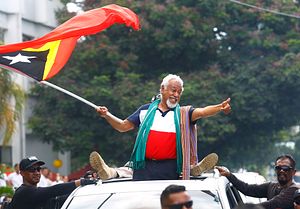Since January, Timor-Leste’s politics has been shrouded in uncertainty following the collapse of its previous governing coalition after the failure to pass a budget amid coalition infighting. Though a new government looks set to take office soon, it will face a range of formidable challenges that will need addressing.
While Timor-Leste has made progress towards statebuilding in some areas since its full independence back in 2002 after a painful struggle against colonialism, it still faces significant political and economic challenges as one of the world’s poorest economies and a polity that that has seen eight governments come and go in less than two decades.
Those challenges have continued on over into 2020 as well. In January, the prior government that had been led by Prime Minister Taur Matan Ruak collapsed after failing to pass a budget, leaving open the possibility of the formation of a new government. And over the past month or so, indications surfaced that a six-party coalition in Timor-Leste led by independence leader and former prime minister Xanana Gusmao has the necessary support to form a new government.
But even if a new government does take office soon – the country’s ninth in less than two decades – Timor-Leste faces some significant challenges ahead. Politically, managing a six-party coalition with a slim majority at just 34 out of 65 parliamentary seats will not be easy, especially given its fragility (currently, the Gusmao-led National Congress for Timorese Reconstruction (CNRT) holds 21 seats; KHUNTO and Democratic Party have five seats each; and three parties have just one seat each). Economically, beyond getting a budget passed, the new government will have to have to contend with short and long-term challenges which include falling energy prices amid a global coronavirus pandemic as well as advancing the Tasi Mane petroleum project, critical given that almost the entirety of government revenue still comes from hydrocarbons.
Of course, that does not mean that these issues are insurmountable. Indeed, for some, Gusmao’s return and the advent of a new government does offer a new opportunity to reset the country’s politics and make progress on the country’s challenges in a more sustainable manner amid what appears to be a more turbulent global outlook. But the key question for Timor-Leste, as ever, is less about whether it can form another government, but whether the country’s leaders can overcome their differences just enough to hold governing coalitions long enough to manage this mix of opportunities and challenges.
































